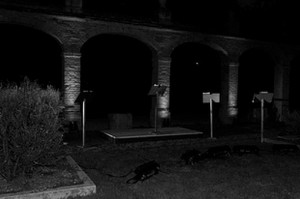 Remember the other playwright’s staged reading? The one where I was called in at the very last minute to do the lights?
Remember the other playwright’s staged reading? The one where I was called in at the very last minute to do the lights?
You may or may not have wondered: how did it turn out? Well, let me tell you: surprisingly well. That is, surprisingly, given how things were after the first rehearsal I attended. And then they went surprisingly – period – for other reasons… but more on that later.
By my second rehearsal it became evident that: one, the director had been panicking a little unnecessarily; and two, really no one was going to do anything about the lights, except telling the head electrician to light up the exedra. The place is a set of Nineteenth Century arches in a lovely garden, very scenic and pleasant. Why they call it an exedra is beyond me, because it’s quite straight and not semicircular at all, but call it one they do – and who am I to grumble? 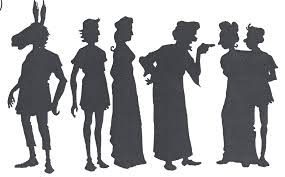
Also, at the second rehearsal the author and her husband showed up, and… well, they didn’t have convulsions exactly, but they looked as though they suspected I was there to sabotage the whole thing… Or rather, the husband did – not greeting me at all, glaring at me as I sat by the director and took notes for her and for myself. The wife watched me warily – probably wondering whether I would unleash magenta-coloured strobes in the middle of the reading, and cackle madly as the audience bolted.
This made the general mood just about as cheerful as you can imagine – but either impervious to this, or maybe spurred by it, most of the readers did quite well, and the play acquired a fine, taut rhythm and more tension than it naturally possesses.
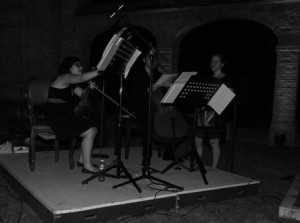 At the third rehearsal, the violin and the cello made their appearance – a boy and a girl, very young and very good at their job. When asked about the play, the boy candidly blurted out that it was “nice, but rather unbalanced”… Now, it may be true that a secondary character runs away with the whole ending, but on the one hand, it somehow works well all the same, and on the other hand, playwrights are oversensitive creatures. The day before the show is not a good time to spring on them this kind of criticism. In fact, no kind of criticism at all – no matter how shrewd. Our author clearly didn’t take it too well, but to her credit, she mastered herself, and did nothing worse than a little conference to explain her reasons for doing what she’d done.
At the third rehearsal, the violin and the cello made their appearance – a boy and a girl, very young and very good at their job. When asked about the play, the boy candidly blurted out that it was “nice, but rather unbalanced”… Now, it may be true that a secondary character runs away with the whole ending, but on the one hand, it somehow works well all the same, and on the other hand, playwrights are oversensitive creatures. The day before the show is not a good time to spring on them this kind of criticism. In fact, no kind of criticism at all – no matter how shrewd. Our author clearly didn’t take it too well, but to her credit, she mastered herself, and did nothing worse than a little conference to explain her reasons for doing what she’d done.
“Because you know, I said so in the introduction,” she concluded, “and perhaps you didn’t catch it, because it’s a much shorter introduction than I’d feel comfortable with…” 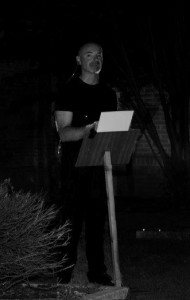
The author’s introduction, which she had insisted on reading before the reading itself, is nearly as long as the play, and explains it into excruciating detail, giving it all away… So it was not entirely a surprise when the boy with the cello said that no, thank you, he’d got it quite well the first time around – and still thought the thing unbalanced.
After which the director ended the rehearsal in a hurry…
And then it was The Day, and we found that the exedra sports a few bushes and a tree awfully in the way, and no place to hide a tripod… We had to improvise a good deal, and in the end we lighted everything from below – the exedra and the readers, plus a couple of side lights hidden in the vegetation. As is often the case with this kind of one-off things, we had no technical rehearsal to speak of, and something like five minutes of twilight to see how the lights actually looked…
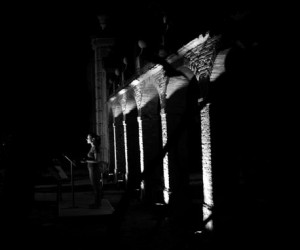 Still, you know what? It all worked out well in the end. The reading was really good, and the music gorgeous, and the lights lovely to look at, and I found that I was quite taken with the whole thing – in spite of having walked in at the last minute, grumpy and terrified in equal parts. Ah, the magic of theatre…
Still, you know what? It all worked out well in the end. The reading was really good, and the music gorgeous, and the lights lovely to look at, and I found that I was quite taken with the whole thing – in spite of having walked in at the last minute, grumpy and terrified in equal parts. Ah, the magic of theatre…
“How you people do it every blasted time, beats me,” the electrician whispered as we sat at the lighting board. “And if you quote Shakespeare in Love again, I’m going to bash you on the head with a stool.”
So I didn’t – but, you know: the natural condition of theatre… etcetera.
But the surprise of surprises was afterwards, when the author thanked me very warmly, “for the present and the past”, because my lights always manage to surprise her, and so on, and so on… Oh well. Sheer relief, I imagine- because I had spared us all the magenta strobes.

And yet…
“the play acquired a fine, taut rhythm and more tension than it naturally posses.”
You hide a very sharp knife, my dear, beneath a silken touch.
LikeLike
😀 I said I’m civilised and helpful – not that I have a good heart…
LikeLiked by 1 person
I didn’t know you had a heart at all!
LikeLike
“Which is how I come to not have a good one,” she said, rasing a shoulder in a heartlessly infinitesimal shrug…
LikeLiked by 1 person
Hey. I was trying to contact you back in June about my Barrymore blogathon I hosted last week in honor of Ethel’s birthday, but couldn’t seem to comment from my WordPress account. However it’s back and working again now, and I’m hosting a new blogathon that I wanted to at least invite you to. The link is below with more information
LikeLike